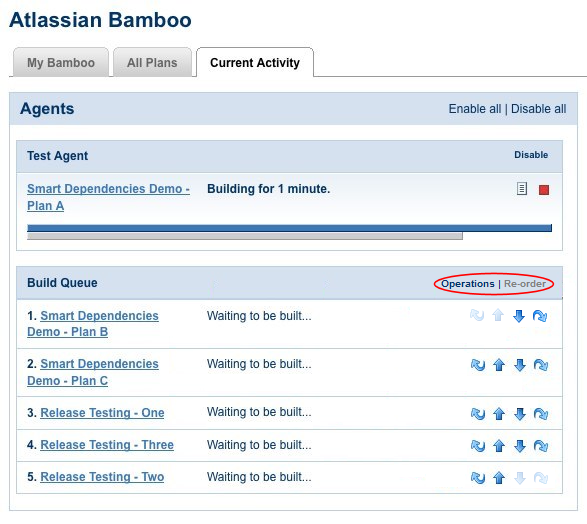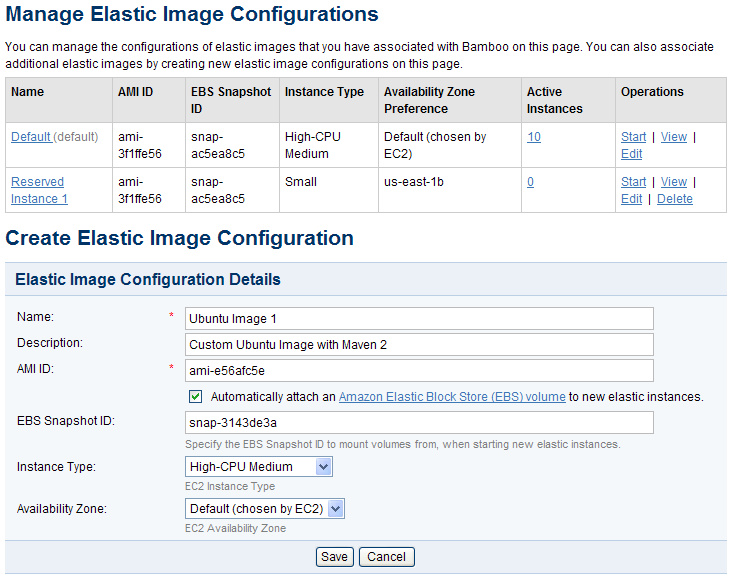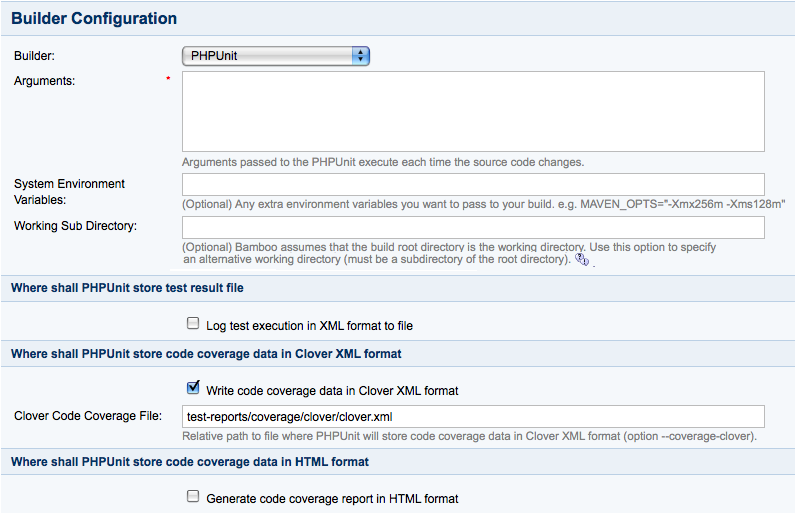Bamboo 2.3 release notes
Bamboo 5.7 has been released! See the new features in the Bamboo 5.7 release notes and read the Bamboo upgrade guide.
6 August 2009
The Atlassian Bamboo team is proud to release Bamboo 2.3.Bamboo 2.3 is all about making your life easier. We've added a host of new features to help you manage your builds better, including dependency blocking, new build notifications, queue reordering and bulk actions for plans.
If you are using Elastic Bamboo, you'll find that Bamboo 2.3 gives you more control over your elastic resources with the introduction of custom elastic images and instance scheduling. You can now specify the availability zone for your elastic images as well, if you want to take advantage of the new 'reserved instances' option from Amazon.
Finally, Bamboo 2.3 includes a number of improvements for the plugin developers. There's a brand new REST API that you can use to get information about projects, plans, builds and reports. We've also added Bandana support and downloadable plugin and web resources.
Upgrading to Bamboo 2.3 is free for all customers with active Bamboo software maintenance.
Highlights of this release:
Thank you for your feedback:
over 36 new features and improvements implemented
over 184 votes fulfilled
Your votes and issues help us keep improving our products, and are much appreciated.
Please keep logging your votes and issues. They help us decide what needs doing!
Upgrading to Bamboo 2.3
You can download Bamboo from the Atlassian website. If upgrading from a previous version, please read the Bamboo 2.3 upgrade guide.
Highlights of Bamboo 2.3
Dependency Blocking Strategies
Bamboo 2.3 gives you greater control over your builds with the introduction of dependency blocking. Dependency blocking is a advanced feature of dependent build triggering that can be used to manage builds which have parents. You can ensure that a "tree" of dependent builds always runs in order of the tree hierarchy, even if child builds are triggered independently of their parents.
- Read more about Dependency blocking strategies.
New Build Notifications and Queue Reordering
Bamboo automatically assign builds to the build queue when they are triggered and no agents are available to run them. In this release, you can now manually reorder builds that have been placed in the build queue. Prioritize a build in the queue if you need it to run urgently, or demote low priority builds. We've also added two new build notifications in this release, 'Build Queue Timeout' and 'Build Queued Without Capable Agents', to help you keep on top of your builds.
- Read more about Reordering jobs in the build queue and Configuring notifications for a plan and its jobs.
Bulk Actions
We've also made it easier for you to configure multiple build plans via the new bulk actions in Bamboo 2.3. Bulk actions allow you to modify key plan information for multiple plans at once, like adding notifications, changing Subversion URLs and credentials and updating web repository URLs.
- Read more about Modifying multiple plans in bulk.
Multiple Elastic Images
Atlassian supplies a Stock images for use with Elastic Bamboo. In this release, you can now create and/or associate multiple custom images (Linux/Unix) with your Bamboo installation. This means that you can use separate images to start up differently configured elastic instances.
If you want to use EC2 Reserved Instances with Elastic Bamboo, you can also manually specify the availability zone for each of your images in this release.
- Read more about Creating a custom elastic image and Managing your elastic image configurations.
Elastic Instance Scheduling
Bamboo 2.3 makes it easy for you to automatically streamline your build resources by configuring schedules for your elastic instances. You can specify exactly how many elastic instances you want to be active at a particular time and Bamboo will automatically start up or shut down elastic instances as needed.
- Read more about Scheduling your elastic instances.
PHPUnit Builder
We have added to our stable of builders in Bamboo by bundling the PHPUnit builder plugin with Bamboo. You can now configure build plans to run using this popular testing framework.
- Read more about configuring a PHPUnit builder for a plan.
Bamboo REST APIs
Bamboo 2.3 exposes a new REST API for developers. You can use the REST API to retrieve information about projects and plans as well as available actions. You can also retrieve information about build results and reports via the REST API. Results can be returned in either XML or JSON format.
- Read more about Bamboo REST APIs.
Plugins Changes
In further improvements for Bamboo developers, we have introduced a number of features to help you build Bamboo plugins more easily.
Firstly, Bamboo 2.3 now includes Bandana support. Bandana is our XML-based framework for persistence that is easy to use in plugins. You can use Bandana to store and retrieve data via contexts and key-value pairs.
- Read more about Bamboo Persistence using Bandana
In addition, you can now define downloadable plugin resources and web resources for your plugins. If you want to include static images, Javascript or CSS with your plugin, you can use downloadable plugin resources or web resources to make them available.
- Read more about Bamboo Persistence using Bandana, Downloadable Plugin Resources and Web Resources.
Plus over 80 fixes and improvements

















